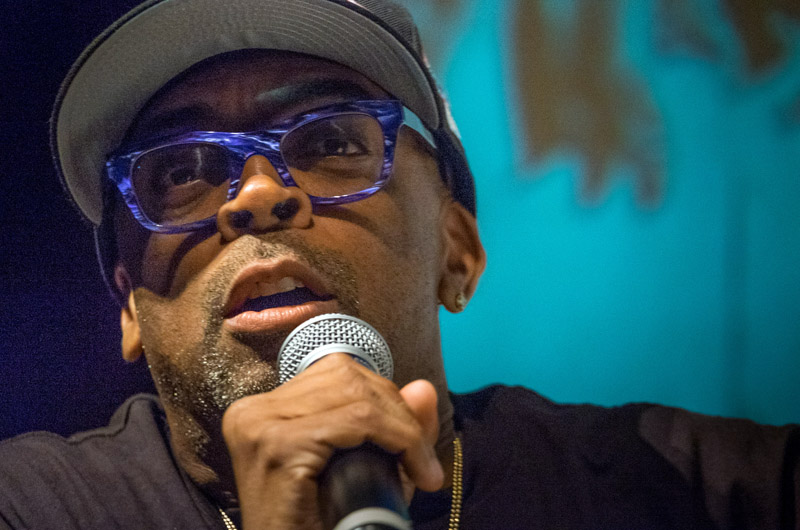There’s an old maxim in Hollywood. When investors back a movie, they want to see the money up there on the screen. Nate Parker, writer, director and lead actor of the film The Birth of a Nation, didn’t have much money, and in a forum that wrapped up the Martha’s Vineyard African American Film Festival last weekend, he said raising funds was the hardest part of a very difficult project.
What Mr. Parker does have in abundance, however, is passion. When the film opens in October, those sitting in movie theatres will see plenty of passion up there on the screen. It’s in the acting, the writing, the cinematography, and perhaps most of all, in Mr. Parker’s determination to get the film made, on his terms, against very long odds.
“People told me, not just no, that it was crazy, but that it was impossible,” Mr. Parker told an enthusiastic sellout crowd at the Martha’s Vineyard Regional High School Performing Arts Center on Saturday evening.
He said when he heard those words, he took it as an indication that he was on the right track.
In just 27 days of shooting and on a budget of under $10 million, Mr. Parker not only got the film made, but it won the grand jury prize and the audience prize at the Sundance Film Festival. The film is already the subject of intense Oscar buzz.
More recently, Mr. Parker (and by extension the movie) became the subject of a different level of scrutiny after stories in The New York Times and Variety reported on a 17-year-old court case where he was accused, and later acquitted, of rape while attending Penn State University.
The Birth of a Nation is the story of Nat Turner, an educated slave in Virginia, who at first obeyed directives from his master to use his position as a preacher to pacify and appease his fellow slaves. But after witnessing brutal injustices, he organized and led a violent slave rebellion in 1831. The film depicts the cruelty and humiliation the slaves suffered in frighteningly realistic detail.
Filmmaker and seasonal Oak Bluffs resident Spike Lee led the talk with Mr. Parker. Aja Naomi King, who plays a leading role in the film as Nat Turner’s wife, Cherry, joined the discussion too.
Mr. Lee kept things loose with pointed humor. He characterized the film as a blessing and a masterpiece, a “film that will change the game.” He urged everyone to fill theatres when the film opens on Oct. 7.
“When I was in elementary school, P.S. 7 [in Brooklyn, N.Y.] we took a day out of school to see Gone With the Wind . . . “ Mr. Lee said leaving his point hanging in the auditorium. The point was lost on no one.
Mr. Parker’s aim is to illuminate the omission and misrepresentation of the story of Nat Turner’s rebellion from the education of many generations of Americans.
“My film is not about slavery, it’s about liberation,” Mr. Parker said.
The liberation starts with the title, the same title used by D.W. Griffith in his 1915 film of the same name. The silent film was wildly popular but controversial when it was released. It has been studied by generations of film students because of its ground-breaking approach to the new medium of motion pictures. It is also known for its openly racist theme, and is credited with the revival of the Ku Klux Klan.
“Very specifically it was designed to disenfranchise people of color,” Mr. Parker said. “It was a massive attack on our representation in the democratic process. He got people to buy in to the idea of white supremacy as self-preservation.”
Mr. Parker is appropriating the title not only in symbolic ways, but in practical ways, too. At most theatres where the film plays, volunteers will organize voter registration booths. His agreement with Fox Searchlight Pictures includes a provision to have the film shown in schools.
At Sundance, the film was screened before an audience of 1,600 people squeezed into one of the main film venues. It was received with emotion and applauded with a prolonged standing ovation.
It was the first time Ms. King had seen the film in its finished version, and she was emotional as she recalled the screening.
“To feel the collective energy of everyone experiencing the same emotions, from beginning to end,” Ms. King said. “I felt like that was the feeling for everyone else, that we had to walk out of that theatre and change the world. It was incredible.”
“I felt like it was a rallying cry,” Mr. Parker said, recalling his thoughts. “Let’s be the change we want to see, and let’s start with our own communities.”






Comments (2)
Comments
Comment policy »